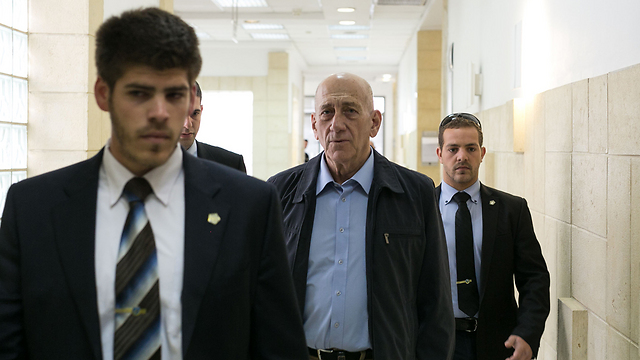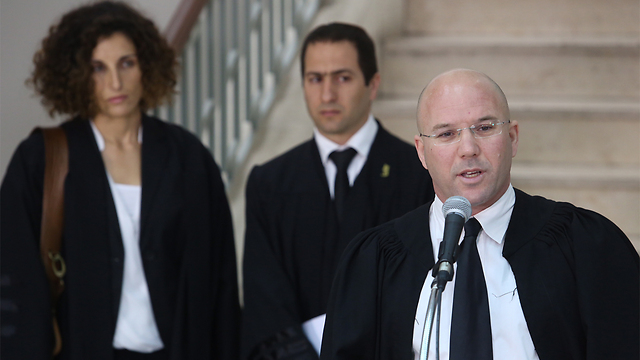
Q&A: Ex-PM Olmert convicted for third time for corruption
Former Israeli prime minister Ehud Olmert was convicted of accepting cash from US Jewish businessman Morris Talansky; it’s the former PM's third conviction – so what happens now?
Former Israeli prime minister Ehud Olmert was found guilty Monday in the so-called Talansky case, in which he was accused of accepting envelopes filled with money from American Jewish businessman Morris "Moshe" Talansky.
The conviction, the third for the prime minister who was forced to step down in 2009 amid accusations of corruption, took place as part of a retrial some two and a half years after the courts cleared him of wrongdoing in the case, which was reopened seven months ago.
Olmert, who is expected to appeal, has also been found guilty of similar charge in two other cases – the most famous called "Holyland" – and is set to serve six years in prison for the offences.
What was Olmert convicted of?
The former prime minister was found guilty of two offenses: The first related to fraud and breach of trust, and the second involving receiving funds illicitly. The fraud and breach of trust pertain to Olmert's systematic acceptance of cash from Talansky, his choice to keep it a secret while he was a minister in Israel's government and then using his power to promote Talansky-related businesses.
The second offense related his failure to reports the funds he received to the state comptroller, thus preventing the comptroller from investigating the funds – a different offense relating to his ministerial responsibilities.
Retrial: Why now?
Olmert was acquitted in 2012 of a series of charges that included accepting cash-stuffed envelopes from Talansky. Olmert was found to have received about $600,000 from Talansky during his term as mayor, and additional amounts in cash during his term as a Cabinet minister, but the court did not find evidence the money had been used for unlawful personal reasons or illegal campaign financing.
The acquittal on the most serious charges at the time was seen as a major victory for Olmert, who denied being corrupt. He was convicted only on a lesser charge of breach of trust for steering job appointments and contracts to clients of a business partner in the Holyland affair, raising hopes for his political comeback.
But Olmert's former office manager and confidant Shula Zaken later became a state's witness, offering diary entries and tape recordings of conversations with Olmert about illicitly receiving cash, leading to a retrial. In the recordings, Olmert is heard telling Zaken not to testify in the first trial so she would not incriminate him.
On Monday, a panel of judges at the Jerusalem District Court ruled that Olmert had accepted $153,950 from Talansky when he was a Cabinet minister, with the money kept hidden in a safe by Zaken.
The judges concluded that Olmert gave Zaken part of that money in exchange for her loyalty, and used the money for his own personal use without reporting it according to law.
What happens now?
Olmert's lawyers vow they will appeal the ruling, but in the meantime the sides are set to reconvene on May 5th to begin the sentencing process.
Olmert's past sentence of six years could come into play as the State fights for additional jail time for the former prime minister. Should the appeal move forward, the Supreme Court could choose to include the previous sentence as part of this conviction, or add additional jail time.
Legal experts say that it is very likely that after all appeals have ended, the top court will hand down a longer, unified sentence for all offenses.
What chances does an appeal have?
Israel's Supreme Court rarely rules on factual aspects of lower courts' rulings: For example, if a certain event did or did not take place. Thus, when the State appealed the Talanksy acquittal the court was called to rule on whether a politician can receive funds without reporting them, and not on the question of whether such funds were received or not.
Thus, an Olmert appeal to the Supreme Court faces bad odds, as the Jerusalem District Court ruled that he did in fact receive the funds illicitly – a fact the top court will likely not contest.
If and when will Olmert go to jail?
After his previous conviction, he was sentenced to six years in prison. He is set to begin to serve his jail time after all pending legal procedures in the case have ended. The last hearing was held in December, but a new one has yet to be scheduled and is expected in the next two months.
What other legal issues is Olmert facing?
There is one more case pending against Olmert; much like the retrial, it too is an outcome of the secret recordings passed on by Zaken to the courts.
In this case, Olmert and his affiliate Navot Tel Zur are suspected of obstruction of justice. The State waited for Monday's ruling as well as the outcome of the appeals before moving forward with this case.
According to suspicions, Olmert and Tel Zur pressured Zaken not to testify for the state in the Holyland case, with Olmert actively working to manipulate her testimony and passing her funds. It is possible the State will waive this case if Olmert's conviction and jail times are confirmed.












